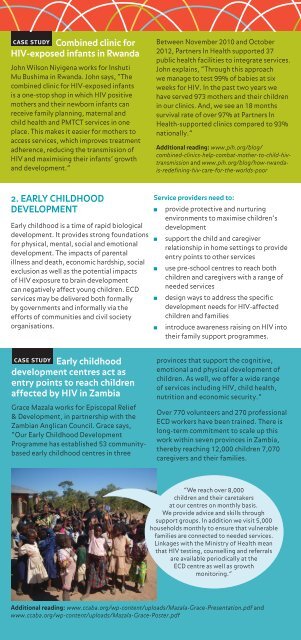Now more than ever” a need to reach the youngest children affected by HIV AIDs
Now more than ever” a need to reach the youngest children affected by HIV AIDs
Now more than ever” a need to reach the youngest children affected by HIV AIDs
Create successful ePaper yourself
Turn your PDF publications into a flip-book with our unique Google optimized e-Paper software.
case study Combined clinic for<br />
<strong>HIV</strong>-exposed infants in Rwanda<br />
John Wilson Niyigena works for Inshuti<br />
Mu Bushima in Rwanda. John says, “The<br />
combined clinic for <strong>HIV</strong>-exposed infants<br />
is a one-s<strong>to</strong>p shop in which <strong>HIV</strong> positive<br />
mo<strong>the</strong>rs and <strong>the</strong>ir newborn infants can<br />
receive family planning, maternal and<br />
child health and PMTCT services in one<br />
place. This makes it easier for mo<strong>the</strong>rs <strong>to</strong><br />
access services, which improves treatment<br />
adherence, reducing <strong>the</strong> transmission of<br />
<strong>HIV</strong> and maximising <strong>the</strong>ir infants’ growth<br />
and development.”<br />
Between November 2010 and Oc<strong>to</strong>ber<br />
2012, Partners In Health supported 37<br />
public health facilities <strong>to</strong> integrate services.<br />
John explains, “Through this approach<br />
we manage <strong>to</strong> test 99% of babies at six<br />
weeks for <strong>HIV</strong>. In <strong>the</strong> past two years we<br />
have served 973 mo<strong>the</strong>rs and <strong>the</strong>ir <strong>children</strong><br />
in our clinics. And, we see an 18 months<br />
survival rate of over 97% at Partners In<br />
Health-supported clinics compared <strong>to</strong> 93%<br />
nationally.”<br />
Additional reading: www.pih.org/blog/<br />
combined-clinics-help-combat-mo<strong>the</strong>r-<strong>to</strong>-child-hivtransmission<br />
and www.pih.org/blog/how-rwandais-redefining-hiv-care-for-<strong>the</strong>-worlds-poor<br />
2. EARLY CHILDHOOD<br />
DEVELOPMENT<br />
Early childhood is a time of rapid biological<br />
development. It provides strong foundations<br />
for physical, mental, social and emotional<br />
development. The impacts of parental<br />
illness and death, economic hardship, social<br />
exclusion as well as <strong>the</strong> potential impacts<br />
of <strong>HIV</strong> exposure <strong>to</strong> brain development<br />
can negatively affect young <strong>children</strong>. ECD<br />
services may be delivered both formally<br />
<strong>by</strong> governments and informally via <strong>the</strong><br />
efforts of communities and civil society<br />
organisations.<br />
Service providers <strong>need</strong> <strong>to</strong>:<br />
■■<br />
■■<br />
■■<br />
■■<br />
■■<br />
provide protective and nurturing<br />
environments <strong>to</strong> maximise <strong>children</strong>’s<br />
development<br />
support <strong>the</strong> child and caregiver<br />
relationship in home settings <strong>to</strong> provide<br />
entry points <strong>to</strong> o<strong>the</strong>r services<br />
use pre-school centres <strong>to</strong> <strong>reach</strong> both<br />
<strong>children</strong> and caregivers with a range of<br />
<strong>need</strong>ed services<br />
design ways <strong>to</strong> address <strong>the</strong> specific<br />
development <strong>need</strong>s for <strong>HIV</strong>-<strong>affected</strong><br />
<strong>children</strong> and families<br />
introduce awareness raising on <strong>HIV</strong> in<strong>to</strong><br />
<strong>the</strong>ir family support programmes.<br />
case study Early childhood<br />
development centres act as<br />
entry points <strong>to</strong> <strong>reach</strong> <strong>children</strong><br />
<strong>affected</strong> <strong>by</strong> <strong>HIV</strong> in Zambia<br />
Grace Mazala works for Episcopal Relief<br />
& Development, in partnership with <strong>the</strong><br />
Zambian Anglican Council. Grace says,<br />
“Our Early Childhood Development<br />
Programme has established 53 communitybased<br />
early childhood centres in three<br />
provinces that support <strong>the</strong> cognitive,<br />
emotional and physical development of<br />
<strong>children</strong>. As well, we offer a wide range<br />
of services including <strong>HIV</strong>, child health,<br />
nutrition and economic security.”<br />
Over 770 volunteers and 270 professional<br />
ECD workers have been trained. There is<br />
long-term commitment <strong>to</strong> scale up this<br />
work within seven provinces in Zambia,<br />
<strong>the</strong>re<strong>by</strong> <strong>reach</strong>ing 12,000 <strong>children</strong> 7,070<br />
caregivers and <strong>the</strong>ir families.<br />
“We <strong>reach</strong> over 8,000<br />
<strong>children</strong> and <strong>the</strong>ir caretakers<br />
at our centres on monthly basis.<br />
We provide advice and skills through<br />
support groups. In addition we visit 5,000<br />
households monthly <strong>to</strong> ensure that vulnerable<br />
families are connected <strong>to</strong> <strong>need</strong>ed services.<br />
Linkages with <strong>the</strong> Ministry of Health mean<br />
that <strong>HIV</strong> testing, counselling and referrals<br />
are available periodically at <strong>the</strong><br />
ECD centre as well as growth<br />
moni<strong>to</strong>ring.”<br />
Additional reading: www.ccaba.org/wp-content/uploads/Mazala-Grace-Presentation.pdf and<br />
www.ccaba.org/wp-content/uploads/Mazala-Grace-Poster.pdf


